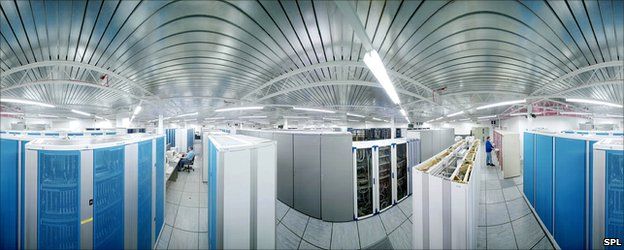Preparing for climate change 'will boost economy'
- Published

Early preparation for climate change impacts would bring economic benefits to the UK, say engineers in a report commissioned by the government.
Engineering the Future - an alliance of professional engineering bodies - says companies will be more likely to invest in nations with secure infrastructure.
It urges regulators to improve links between sectors for better planning.
A climate-constrained future will bring more disruption to energy, transport, water and IT, it warns.
This increases the risk of "cascade failures", where a breakdown in one system has knock-on effects on others - such as a flood that takes out the local electricity supply, which in turn affects the mobile phone network.
Potential impacts of climate change covered by the report - Infrastructure, Engineering and Climate Change Adaptation - include:
- damage to roads and railway tracks from prolonged high temperatures
- flooding of drainage networks
- increased damage to buildings from storms
The report concludes that complete protection against climate impacts will not be affordable, and society is going to have to decide what levels of prevention should be funded for various types of threat.
"At the moment, there's no mechanism for having that debate with the public, or even for having it within the regulatory and policy space," said David Nickols, managing director of future energy with engineering consultants WSP Group and a main author on the report.
"We're building infrastructure that's going to last 30 to 40 years, and yet we're not having a debate about whether our children will be happy with what we did."
French connection
Overall, the UK is not doing too badly compared with neighbouring countries, the authors say.
The government has established a national adaptation strategy and major infrastructure providers are having to set out their plans for keeping the country running in a future projected to be several Celsius hotter, with more extreme weather events and higher sea levels around the coast.
The report highlights some ways in which authorities are already adapting.
For example, the Highways Agency recently changed its specification for road surfaces to a French standard, recognising that roads are going to have to cope with higher average temperatures.
However, the engineers cite various ways in which they believe the response is falling short - in particular, through lack of co-ordination between agencies and regulators that ought to be working together.
"There's a bit of a regulatory mess," said Eric Sampson, a visiting professor in transport at Newcastle University.
"Water, rail, electricity - most work has looked at one item in isolation but in fact they're all interlinked and we have to bring them together and look at how one item is affecting another."
In particular, he said, many parts of society depend heavily on energy.
"If the electricity supply goes down, so does the cross-[English] Channel radar system, you can't run Eurostar, you can't run an airport - so there's a total dependence between transport and energy," he said.
Another of the report's authors, information technology specialist Will Stewart from Southampton University, highlighted the total dependence of IT on a reliable electricity supply.
"Total internet business is now about 15% and rising fast, but essentially all business depends on the phone network, mobiles working and credit card payments going through," he said.
Although modern networks offer far more facilities than older technologies, they are typically less resilient, he explained.
Whereas traditional land-line phones would keep working in the event of a power cut, mobile networks and cordless phones are more easily taken offline by outages.
The engineers emphasised that building more resilient infrastructure need not come with a huge price tag - it was mainly a case of understanding the issues and taking sensible, far-sighted decisions.
And taking those decisions early would, they said, bring rewards in a world where many companies were not constrained by national boundaries.
"If your services are more reliable [than your neighbours'], this is where they'll come," said Professor Stewart.
"Effective, reliable infrastructure underpins economic activity - and perception that infrastructure is not resilient does affect investment decisions.
"And there are also consultancy benefits - if we do this sooner and better than other countries, that's saleable."
The report was commissioned by the Department for Environment, Food and Rural Affairs (Defra), which is responsible for climate adaptation.
Ministers will consider its findings as they work on a cross-government strategy on adaptation and infrastructure.
- Published31 January 2011
- Published28 January 2011
- Published8 December 2010